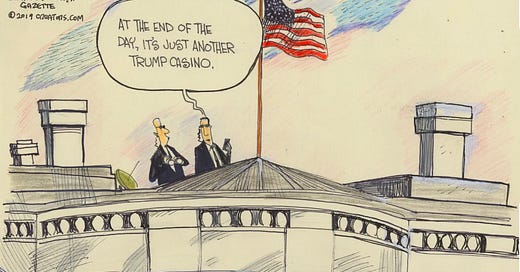Trump’s Funding Freeze: A Blueprint for National Instability
Trump’s actions mirror his reckless business strategies: short-term moves with no consideration for long-term consequences.
The Trump administration’s freeze on federal grants, loans, and Medicaid funding under the Office of Management and Budget (OMB) is already creating chaos. Medicaid funding, which provides healthcare for millions of low-income Americans, has been abruptly halted in Illinois, affecting 3.9 million residents, including children, seniors, and people with disabilities. Governor JB Pritzker called the freeze “unlawful,” while Senator Dick Durbin denounced it as “unconstitutional and inhumane.” Medicaid is just one of many federally funded programs now in jeopardy, alongside disaster relief, public education, and critical medical research (Capitol Fax).
The freeze may not cause outright financial collapse, but the damage—systemic inefficiency, disrupted services, and harm to vulnerable populations—will take years to undo.
The implications of the freeze are widespread. State governments, particularly those reliant on federal programs like Medicaid, now face immediate budget crises. Essential services such as healthcare, food assistance, and education are under threat, which could leave vulnerable populations—children, low-income families, seniors, and people with disabilities—bearing the brunt. Additionally, healthcare providers and schools are already reporting delays and disruptions, while small businesses reliant on federal loans may face closures. According to the Financial Times, the freeze affects hundreds of billions of dollars, throwing state systems into chaos and uncertainty.
Federal agencies have been ordered to align funding with the administration’s ideological priorities, including eliminating support for programs related to equity, environmental justice, and reproductive health. Acting OMB Director Matthew Vaeth defended the freeze as combating “Marxist equity” and “social engineering policies.” However, critics argue that this freeze reflects less oversight and more of an agenda to dismantle programs essential to millions. As Durbin stated, “Denying critical funding will not make America great.”
The long-term effects of this freeze extend beyond state budgets and immediate services. Halting federal support for scientific research jeopardizes innovation and delays vital progress in medicine, technology, and infrastructure. With diminishing incentives for scientists and engineers to remain in the U.S., the country risks falling behind globally, a problem further exacerbated by figures like Elon Musk advocating for importing cheaper labor. This brain drain could weaken America’s competitiveness in critical industries for years to come.
Donald Trump’s history of bankruptcy is well-documented. His casinos, hotels, and entertainment ventures—like the Trump Taj Mahal and Trump Entertainment Resorts—collapsed under unsustainable debt. Each time, Trump walked away unscathed, leaving others to bear the losses. This same pattern now defines his presidency, as his reckless policies push the nation into instability and inefficiency.
Trump’s governing style mirrors his business strategy: short-term gambles with no thought for long-term fallout. While Trump escaped the consequences of his personal bankruptcies, the cost of these actions will be felt by millions of Americans who rely on Medicaid, public services, and federal support. The freeze may not cause outright financial collapse, but the damage—systemic inefficiency, disrupted services, and harm to vulnerable populations—will take years to undo.





